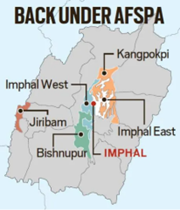TAG: GS-2: GOVERNANCE & GS-3: INTERNAL SECURITY
CONTEXT: The Union Home Ministry has re-imposed the Armed Forces (Special Powers) Act (AFSPA) in the limits of six police stations in Manipur due to the ongoing ethnic violence. It is aimed at assisting security forces in controlling insurgent activities.
EXPLANATION:
More about news:
- The Union Home Ministry reimposed AFSPA in Manipur on November 13, 2024, due to ethnic violence. Six police station limits in five districts have been declared “disturbed areas” for security operations.
- These areas include parts of Imphal West, Imphal East, Jiribam, Bishnupur, and Kangpokpi.
- AFSPA was withdrawn in April 2022 due to improved security, but the situation remains volatile.
- The reimposed AFSPA will be effective until March 31, 2025.
- The Army and Assam Rifles can operate freely without waiting for Magistrates or police.
- Ethnic violence between Meitei and Kuki-Zo people has led to over 240 deaths since May 2023.
- Recent violence since November 7 has killed at least 14 people.
- Central and State governments can issue disturbed area notifications under AFSPA.

About the Armed Forces Special Powers Act (AFSPA):
- It is a law enacted by the Parliament in 1958 which gives the armed forces special powers and immunity to maintain public order in “disturbed areas”.
- When is it applied? It can be applied only after an area has been declared “disturbed” under section 2 of the Act.
- What is a Disturbed area? An area can be considered to be disturbed due to differences or disputes among different religious, racial, language, or regional groups or castes or communities.
Who declares an area as disturbed?
- The Central Government, or the Governor of the State or administrator of the Union Territory, can declare the whole or part of the State or Union Territory as a disturbed area.
- It can be invoked in places where “the use of armed forces in aid of the civil power is necessary”.
The ‘special powers’ of armed forces under AFSPA are:
- They have the authority to prohibit a gathering of five or more persons in an area, can use force or even open fire after giving due warning if they feel a person is in contravention of the law.
- If reasonable suspicion exists, the army can also arrest a person without a warrant, enter or search a premises without a warrant, and ban the possession of firearms.
- Any person arrested or taken into custody may be handed over to the officer in charge of the nearest police station along with a report detailing the circumstances that led to the arrest.
These armed forces are immune from prosecution unless the Union Government provides sanction to the prosecuting agencies.
Where is AFSPA in force now?
- Apart from Nagaland, the AFSPA is currently in force in Jammu and Kashmir, Assam, and Manipur except Imphal, and Arunachal Pradesh.
Source:
https://indianexpress.com/article/india/manipur-afspa-violence-jiribam-mha-9669599/lite/
Spread the Word



